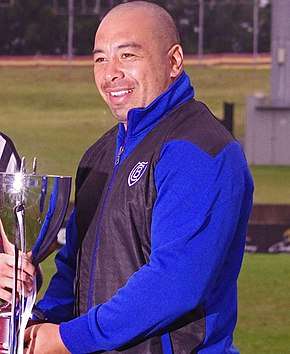Jim Dymock
Jim Dymock (born 4 April 1972) is an Australian former professional rugby league footballer and coach. A Tonga and Australia international and New South Wales State of Origin representative five-eighth or lock, he played club football for Sydney's Western Suburbs Magpies, Canterbury-Bankstown Bulldogs, Parramatta Eels, finishing his career in the Super League for the London Broncos. He then embarked on a coaching career, becoming head coach of the Tongan national team. He spent the latter part of the 2011 NRL season as head coach of the Canterbury-Bankstown Bulldogs, and is the assistant coach of the Gold Coast Titans.
 | ||||||||||||||||||||||||||||||||||||||||||||||||||||||||||||||||||||||||||||||||||||||||||||
Personal information | ||||||||||||||||||||||||||||||||||||||||||||||||||||||||||||||||||||||||||||||||||||||||||||
|---|---|---|---|---|---|---|---|---|---|---|---|---|---|---|---|---|---|---|---|---|---|---|---|---|---|---|---|---|---|---|---|---|---|---|---|---|---|---|---|---|---|---|---|---|---|---|---|---|---|---|---|---|---|---|---|---|---|---|---|---|---|---|---|---|---|---|---|---|---|---|---|---|---|---|---|---|---|---|---|---|---|---|---|---|---|---|---|---|---|---|---|---|
| Born | 4 April 1972 Sydney, New South Wales, Australia | |||||||||||||||||||||||||||||||||||||||||||||||||||||||||||||||||||||||||||||||||||||||||||
Playing information | ||||||||||||||||||||||||||||||||||||||||||||||||||||||||||||||||||||||||||||||||||||||||||||
| Height | 179 cm (5 ft 10 in) | |||||||||||||||||||||||||||||||||||||||||||||||||||||||||||||||||||||||||||||||||||||||||||
| Weight | 93 kg (14 st 9 lb; 205 lb) | |||||||||||||||||||||||||||||||||||||||||||||||||||||||||||||||||||||||||||||||||||||||||||
| Position | Lock, Five-eighth | |||||||||||||||||||||||||||||||||||||||||||||||||||||||||||||||||||||||||||||||||||||||||||
| ||||||||||||||||||||||||||||||||||||||||||||||||||||||||||||||||||||||||||||||||||||||||||||
Coaching information | ||||||||||||||||||||||||||||||||||||||||||||||||||||||||||||||||||||||||||||||||||||||||||||
| ||||||||||||||||||||||||||||||||||||||||||||||||||||||||||||||||||||||||||||||||||||||||||||
Background
Dymock was born in Sydney, New South Wales, Australia on 4 April 1972.
He is of Tongan descent. He began playing rugby league as an Eastern Suburbs junior with Woolloomooloo Warriors and then Paddington Colts. He then switched to the South Sydney juniors competition. He played for Zetland Magpies alongside players such as Jim Serdaris and Terry Hill who went on to make First Grade also. He represented South Sydney in their S.G. Ball and Jersey Flegg teams.
Playing career
Dymock began his first-grade club career in the 1991 NSWRL season at the Western Suburbs Magpies, opposing Wally Lewis and scoring two tries in his debut. He played 31 times for the club, but was "glad to go" after troubles with his manager while at Wests.[4]
In 1993, Dymock joined Canterbury Bulldogs. Dymock represented Tonga at the 1994 Pacific Cup and in 1995.[5] During the 1995 season, Dymock, along with Dean Pay, Jason Smith and Jarrod McCracken reneged on their Australian Super League contracts, giving 'unfair inducement' as their reason which was later supported in the courts. Although Dymock chose to sign with the Australian Rugby League (ARL) competition, he remained with the Bulldogs for the 1995 season and contributed to the club's grand final win over Manly. Dymock won the Clive Churchill Medal for man-of-the-match. Dymock also played six times between 1995-1996 for Australia. He was part of the successful Australian squad that won the 1995 Rugby League World Cup in England.
Dymock joined the ARL-aligned Parramatta for the start of the 1996 season. Dymock was selected to represent New South Wales as an interchange for all three games of the 1996 State of Origin series. He played for the Eels during the rest of the Super League war and the unification of the Super League and ARL into the current National Rugby League competition. In 1997, he was selected at five-eighth for games I and II of the 1997 State of Origin series, scoring a try in game II, and he was chosen to play at lock in game III of the 1998 State of Origin series. He played 112 games for Parramatta between 1996-2000.
Dymock left the Eels and Australia at the end of 2000 season, he joined English Super League club London Broncos in time for the 2001 season. He enjoyed 4 seasons at the Broncos. He ended his playing career at the end of the 2004 season after playing 95 games for London.
Coaching career
Dymock assisted head coach Ricky Stuart at the Cronulla-Sutherland Sharks. He later returned to the Bulldogs. Dymock was also the head coach of the Tongan national rugby league team that played in the 2008 Rugby League World Cup. On 14 July 2011, Jim Dymock was announced as the Bulldogs new head coach, after Kevin Moore stood down from the position.[6] However, on 14 November 2011, Dymock was replaced by Des Hasler.[7]
References
- Rugby League Project
- Rugby League Project Coaches
- Yesterday's Hero Archived 16 August 2012 at the Wayback Machine
- Daniel Ramus. "Legend Q&A". Rugby League Week. Sydney, NSW: PBLMedia (1 July 2009): pgs 30–31.
- John Coffey, Bernie Wood (2008). 100 years: Māori rugby league, 1908-2008. Huia Publishers. p. 282. ISBN 978-1-86969-331-2. ISBN 1-86969-331-0.
- "Tug-of-war over Mason". Sky Sports. 5 August 2008. Retrieved 6 August 2008.
- McDonald, Margie (14 November 2011). "Des Hasler never contemplated a clean-out at the Bulldogs". The Australian.
Sources
- Whiticker, Alan; Hudson, Glen (2007). The Encyclopedia of Rugby League Players. Wetherill Park, New South Wales: Gary Allen Pty Ltd. p. 609. ISBN 978-1-877082-93-1.